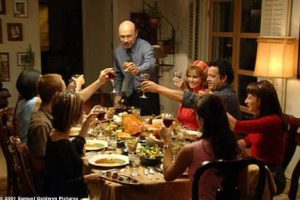Storyline:
The movie Tortilla soup centers around a Mexican-American family living in Los Angeles. The patriarch of the family, Martin shares a home in the suburbs with his three adult daughters, Leticia, Carmen, and Maribel. The movie is centered around the dinner table, as Martin, a semi-retired chef, places a lot of importance on eating meals with family. Eating elaborate meals together as a family is obviously very important to Martin, because he has continued the tradition on even though he has lost his sense of taste and smell since the death of his wife. At these elaborate dinners is where each of Martin’s daughters shares whatever news they have going on in each of their lives. As the film progresses you see Martin fall in love with a recently divorced family friend named Yolanda before eventually marrying her. Maribel starts a relationship with a man named Andy, and after briefly dating, she invites him to dinner, and announces that she is moving in with him. They eventually break up due to the stress of moving in together, before reuniting later in the movie. Leticia, is attracted to Orlando, a baseball coach at her school, and after receiving anonymous love letters assumed to be from him, but actually from her students, she eventually is able to elope with him. Lastly, Carmen eventually accepts a job offer as a business analyst in Barcelona. However, shortly after she is left at the airport she returns home, and pursues a career like her fathers, and is able to open up her own restaurant. The role food plays in this film is as a way to unite the family, and start conversation wether it be for good or for bad. The large meals Martin prepares are a staple to the family, and they keep the family touch even throughout difficult situations.

Tradition:
Tradition is something that is very important to Martin wether it be his family traditions, like eating meals together, or preparing dishes in the traditional way. One of the key supporting scenes from the film came when Carmen complained that she though something was missing from the squash flower soup. She went on to say she believed it was Serranos, to which Martin responded that he had included them, just without the seeds because of his respect for tradition. While at the table Carmen says “But you removed the seeds.” and Martin replies “You would add seeds. I respect tradition, I always make squash flower soup this way.” (10:12)
Consumption as Communication:
Throughout the movie, and his life Martin regularly uses his culinary skills to show the people he loves that he cares about them. He places a lot of value around the family eating meals together, and he always makes sure to prepare elaborate, delicious dishes. Martin using food as his main way to communicate is extremely evident when he is talking with a friend about the restaurant he ran with his wife in the past. Martin states “As for the restaurant, I don’t miss it for a minute. Too many fights. Ana was right, I didn’t know how to run it. I only know how to cook. Now even that is going.” (21:48) Luckily, Martin’s friend is able to reassure him, and remind him that Beethoven made some of his best works when he was unable to hear a thing. Martin’s friend then goes on to say “It’s a good thing I still enjoy drinking, and eating, and talking.” (22:29) which further supports how important eating meals with loved ones is extremely important to Martin.
Food as Identity:
Both Martin and Carmen are excellent chefs, and the food they prepare gives the viewer a good look into their individual identities. Martin, an older man, is very fond of tradition, and preparing foods in the way they have been for years. This is evident early in the movie when he makes squash flower soup and removes the seeds from the Serrano peppers, as well as nearly every time he is preparing a meal for his family. In contrast, Carmen is very open to trying new things, and preparing foods in different ways. This leads to a bit of a conflict with her father, but nothing too serious. During a scene where Carmen is preparing a meal for a man, he asks if she made one of her dad’s specialties, to which she replies that it is her own spin. Carmen states “It’s tamarind-glazed lamb on cumin cabbage with a tangerine salsa. The lamb is French-South American, the cabbage is pure Mexican, and the salsa is Caribbean.” (32:40) she then goes on to say “Dad calls my dishes mutts.” (32:45) which implies that there is some tension between Carmen’s cooking style, and that of her father. According to Merriam-Webster Dictionary the definition of the word mutt is “a dog that is of inferior quality or of mixed breed. For Martin to refer to his daughters dishes in this way leads Carmen to believe that her father is not very impressed by her dishes, however by the end of the movie Martin is supporting his daughter and her restaurant.
Ideology:
The Ideology of Slow Food is extremely prevalent throughout the movie. Slow Food is a movement that supports local food and traditional cooking which is also extremely important to Martin. Another major aspect of Slow Food is taking the time to enjoy the food you are eating with those around you, another very important ideology for Martin. Over and over throughout the movie Martin’s family eats together, and converses over the traditional foods which Martin has prepared. For example, when Carmen tells her family that she will be taking a job in Barcelona, she waits until the family dinner, when she can tell everyone together. (38:40) Additionally, when Maribel informs her father she wants to take some time off college, she again waits until she is at a meal surrounded by her loved ones. She tells her father she is going to be moving in with Andy, which greatly upsets her father. (55:00) Dinner together is extremely important to Martin and his family, and is the main place they are able to express themselves.
Opinion:
I thought the film was very enjoyable, and I could pretty easily identify many links to our class. I enjoyed learning more about Mexican-American food through my seat at the Naranjo’s dinner table. Several times both Martin and Carmen go into great detail describing the dishes they have prepared, and the movie shows a lot of the preparation process. I liked that I was able to identify that the focus of the movie was on the food as a way to unite the Naranjo family.
References
Samuel Goldwyn Films (Producer) & Maria Ripoll (Director). (2001).Tortilla Soup [Motion Picture]. United States:
Starz/Encore Entertainment.